|
|
|
Sort Order |
|
|
|
Items / Page
|
|
|
|
|
|
|
| Srl | Item |
| 1 |
ID:
091062
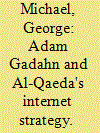

|
|
|
|
|
| Publication |
2009.
|
| Summary/Abstract |
In the May 2004, the FBI announced that it was searching for Adam Yahiye Gadahn, a 25-year-old American, for his suspected role as an al-Qaeda operative. A few months later, a 75-minute videotape was released in which a masked man calling himself Azzam the American claimed to be a member of al Qaeda and threatened that the streets of American would run red with blood.
|
|
|
|
|
|
|
|
|
|
|
|
|
|
|
|
| 2 |
ID:
102185
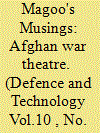

|
|
|
| 3 |
ID:
095648
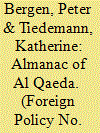

|
|
|
| 4 |
ID:
131825
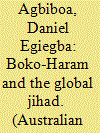

|
|
|
|
|
| Publication |
2014.
|
| Summary/Abstract |
This article critically examines the lethal and growing threat posed by the Nigeria-based Islamist terrorist group Boko Haram or People Committed to the Propagation of the Prophet's Teachings and Jihad. Specifically, the article explores the group's emergence and grievances, as well as its increasing links to the global jihad as spearheaded by al-Qaeda in the Islamic Maghreb and its affiliates like the Somalia-based al-Shabaab. The article then evaluates how the Nigerian state and countries fighting terror abroad, like the USA, have responded to the Boko Haram threat. The conclusion offers some policy prescriptions on how best to respond to Boko Haram.
|
|
|
|
|
|
|
|
|
|
|
|
|
|
|
|
| 5 |
ID:
173771
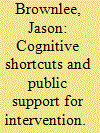

|
|
|
|
|
| Summary/Abstract |
Scholars of public opinion on military intervention agree that survey respondents make judgments from limited information. Yet researchers still question whether ordinary Americans reflect elite attitudes or instead reach their own “pretty prudent” conclusions from the stated principal policy objective (PPO). This article adjudicates the debate while incorporating lessons from the study of bounded rationality. Evidence comes from an original data set of aggregate US public opinion, covering 1,080 nationally representative survey items about launching operations, across thirty-five countries, during 1981 to 2016. Tests show that PPO matters: pursuing “internal policy change” is less popular than restraining international aggression. However, language reflecting White House cues and one prominent cognitive shortcut (the “availability heuristic”) statistically and substantively outperforms PPO at predicting intervention support. The results indicate that when ordinary Americans are polled about using force against salient foes (Saddam Hussein, al-Qaeda, Islamic State in Iraq and Syria), elements of bounded rationality can overtake the prudence expressed toward less vivid problems.
|
|
|
|
|
|
|
|
|
|
|
|
|
|
|
|
| 6 |
ID:
096760
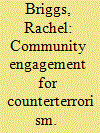

|
|
|
|
|
| Publication |
2010.
|
| Summary/Abstract |
This article explores the development of community engagement within the UK's strategy to tackle international terrorism linked to and inspired by Al-Qaeda, commonly known as CONTEST. It focuses mostly on the 'Prevent' strand of the strategy which seeks to prevent radicalization towards violence, reduce tacit support for violence, and increase the resilience of communities to tackle radicalization and extremist messages themselves. Community engagement for counterterrorism also relates to certain aspects of the 'Pursue' strand of CONTEST, and these are highlighted. The article outlines the case for a community-based approach to counterterrorism and outlines a number of the key developments in its emergence from 2005 onwards. It analyses the performance of this aspect of the counterterrorism strategy, pointing to a number of shortcomings in relation to the establishment of partnerships, the integration of the approach, capacity shortfalls at the local level, and the wider challenges of a hostile political and media environment. Written as the new UK coalition government announces a review of the 'Prevent' strategy, it offers a number of recommendations for the future direction of this area of policy. It calls for an overhaul in working styles, a focus on people rather than projects, and the need to draw a much clearer line between downstream and targeted 'Prevent' work and the broader and longer-term community development work, with the latter encapsulated within the government's Big Society Programme and aimed at all fragile communities, not just Muslims.
|
|
|
|
|
|
|
|
|
|
|
|
|
|
|
|
| 7 |
ID:
093126
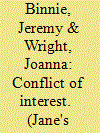

|
|
|
| 8 |
ID:
093706
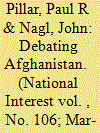

|
|
|
|
|
| Publication |
2010.
|
| Summary/Abstract |
With thirty thousand new boots on the ground, Kabul is set to become the primary focus of Obama's strategic agenda. But is this the right choice? Pillar, former national intelligence officer for the Near East and South Asia, argues that a just intervention has devolved into a worthless quagmire, while Iraq War veteran Nagl believes al-Qaeda must be vanquished in the borderlands of AfPak.
|
|
|
|
|
|
|
|
|
|
|
|
|
|
|
|
| 9 |
ID:
100233


|
|
|
| 10 |
ID:
122771
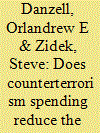

|
|
|
|
|
| Publication |
2013.
|
| Summary/Abstract |
Following the 11 September 2001 attacks, the US government increased its counterterrorism (CT) funding and created several Federal Agencies such as the Department of Homeland Security; Transportation Security Administration; and National Counterterrorism Center. Similarly, the 7 July 2005, London bombings also compelled the British government to increase its CT funding. These examples illustrate a phenomenon that when states experience terrorism, they dramatically increase public safety spending in order to reduce or eliminate the incidents of and casualties resulting from acts of terror. Using statistical data collected from 34 countries covering nine years, this article examines recent CT spending increases. Critically, the authors explore whether recent public safety expenditures can measurably reduce the number of domestic and international terrorist attacks. The implications of their findings should be salient for policy-makers' assessments of their countries' current CT strategies and policies concerning their respective Intelligence and Security Communities.
|
|
|
|
|
|
|
|
|
|
|
|
|
|
|
|
| 11 |
ID:
111539
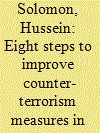

|
|
|
|
|
| Publication |
2012.
|
| Summary/Abstract |
In recent years, South Africa has come to be used by international terrorists as a safe house, for paramilitary training purposes, as a base from which to plan attacks on other countries and as a conduit for financial transactions. South Africa's own counter-terrorism initiatives have been labelled 'reactive' by analysts. Indeed, the existing counter-terrorism regime suffers from a lack of political will to issues of corruption and ineptitude bedevilling the security apparatus of the state. However, using lessons learned from other countries, Pretoria can yet turn the tide against international terrorism by adopting more pro-active measures and by undertaking steps aimed at the depoliticisation and decriminalisation of the security forces.
|
|
|
|
|
|
|
|
|
|
|
|
|
|
|
|
| 12 |
ID:
096752


|
|
|
|
|
| Publication |
2010.
|
| Summary/Abstract |
Counterterrorism efforts over the past five years have yielded important progress against Al-Qaeda abroad, even with heightened anxiety about the threat of attacks at home. There was certainly no 'clash of civilizations'; violent Salafism engendered a muscular backlash in Muslim-majority countries, which threatened Al-Qaeda's ability to recruit and even survive. At the same time, the policies of major states became more effective and better aligned. A nascent counterterrorism coalition emerged with unprecedented sharing of intelligence, operations and deradicalization techniques (especially bilaterally). In the face of these developments, a defensive Al-Qaeda scrambled to exploit vulnerabilities so as to regain a mental edge. The result was two tactical setbacks for the allies: first, Al-Qaeda and its associates redoubled their efforts to kill civilians on western soil, focusing particularly on radicalized home grown amateurs; and second, they leaned more heavily on reinvigorated affiliates, some of whom tried to project force beyond their local operating areas for the first time. As a result, terrorist operations in the US and UK were more frequent, unpredictable and unsophisticated, but nonetheless potentially lethal. As the period drew to a close, the crucial question was whether the two western allies could maintain their nerve, luck, skill and sufficient equilibrium to both fend off a domestic attack and plan for an effective strategic response in the event that one occurred.
|
|
|
|
|
|
|
|
|
|
|
|
|
|
|
|
| 13 |
ID:
095989
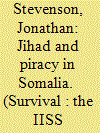

|
|
|
|
|
| Publication |
2010.
|
| Summary/Abstract |
Somalia's chronic governance and security problems started in 1991, when strongman President Mohammed Siad Barre was overthrown in a civil war. Competing clans then commandeered weapons supplied to his government alternately by the Soviets and the Americans during the Cold War, and proceeded to carve the country up into armed clan fiefdoms without central authority. Then came the famine that an ineffectual United Nations mission was unable to address, prompting the United States to lead an international military intervention in December 1992 with the relatively narrow intention of facilitating humanitarian relief, though in the grander service of a 'new world order'.
|
|
|
|
|
|
|
|
|
|
|
|
|
|
|
|
| 14 |
ID:
139572
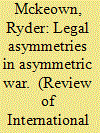

|
|
|
|
|
| Summary/Abstract |
Standard conceptions of the relationship between international law and war in International Relations (IR) mostly oscillate between the sceptical view that law is mostly irrelevant in times of conflict, and the optimistic view that law is a meaningful moral standard that effectively constrains violence. Modern asymmetric conflicts between liberal democratic states and non-state actors such as the Taliban, al-Qaeda, or Hamas challenge these conceptions, however, as they are at once increasingly legal and extremely violent. Drawing inspiration from IR and International Law (IL) scholarship from multiple theoretical paradigms, this article examines the legal asymmetries before, during, and after asymmetric conflict. Noting that law is at once a useful tool and a strong normative force, it argues that a good understanding of legal asymmetries can supplement existing theories of asymmetric war, continue the dissolution of false dichotomies and open up interesting avenues of research in IR, and help both scholars and policymakers understand how international law influences modern asymmetric conflict against non-state actors.
|
|
|
|
|
|
|
|
|
|
|
|
|
|
|
|
| 15 |
ID:
138564
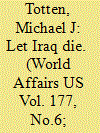

|
|
|
|
|
| Summary/Abstract |
The Kurds in the north, who make up roughly twenty percent of the population, want out. They never wished to be part of Iraq in the first place. To this day, they still call the bathroom the “Winston Churchill,” in sarcastic homage to the former British prime minister who shackled them to Baghdad. Since the early 1990s, they’ve had their own government and autonomous region in the northern three provinces, and they held a referendum in 2005 in which 98.7 percent voted to secede and declare independence. The only reason they haven’t finally pulled the trigger is because it hasn’t been safe; the Turks—who fear the contagion of Kurdish independence inside their own country—have threatened to invade if they did.
|
|
|
|
|
|
|
|
|
|
|
|
|
|
|
|
| 16 |
ID:
100297
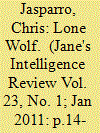

|
|
|
| 17 |
ID:
093702
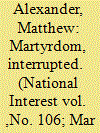

|
|
|
|
|
| Publication |
2010.
|
| Summary/Abstract |
THE SEVEN-year manhunt came down to this. In the wee morning hours of a September dawn, Noordin Mohammed Top, the most wanted terrorist in Southeast Asia, huddled in a burning house in central Java along with three of his men. The fire started when a round shot by police in the initial standoff ignited the fuel tank of a motorcycle inside the courtyard of the house, forcing Top to seek refuge in the bathroom, where he decided to make his final stand. Top believed that dying during what he considered to be legitimate jihad would earn him a seat in heaven, and taking a few apostate policemen with him would ensure a bonus reward in the afterlife. The Indonesian police had come close to catching Top before, but he proved to be an elusive, and lethal, fugitive. Perhaps this would be their moment of glory.
|
|
|
|
|
|
|
|
|
|
|
|
|
|
|
|
| 18 |
ID:
119774
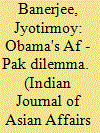

|
|
|
| 19 |
ID:
091491
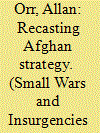

|
|
|
|
|
| Publication |
2009.
|
| Summary/Abstract |
The following article aims to examine current counter-insurgency (COIN) strategy in Afghanistan to posit an untried theoretical concept of operations for the war being waged there. By doing so it shall argue that Coalition and NATO forces operating there may be required to fundamentally recast Afghan war-policy if a resurgent Taliban and Al-Qa'eda are to be countered in both the military and political spheres of present day Afghanistan. By way of strategy this article shall posit that a more optimal strategy in Afghanistan, in light of the campaign's apparent difficulties, might be to seed local security apparatuses, designated herein as 'Rural Paramilitary Forces'.
|
|
|
|
|
|
|
|
|
|
|
|
|
|
|
|
| 20 |
ID:
093570
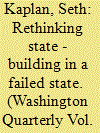

|
|
|
|
|
|
|
|